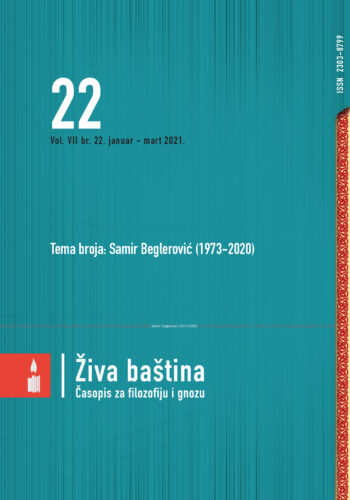UDK 28-1
Autori u tekstu razmatraju osnovna pitanja sadržaja islamskog vjerovanja koja su se bila pojavila u ranoj muslimanskoj klasici. Tekst nastoji kritički proučiti društveno-religijske aspekte pojave prvih akaidskih, odnosno vjerskih pitanja, te ranih teoloških škola (hanbelije, haridžije, murdžije), koje su artikulirali u zasebnim i kraćim cjelinama (credima). U tekstu se dalje problematizira pitanje u kojoj mjeri je “pripadanje zajednici muslimana” utjecalo na profiliranje sadržaja članaka vjerovanja, odnosno prvih akaidskih creda, a konsekventno tome ranomuslimansko opredjeljenje za konfesionalni oblik “pravovjernosti” koji je, u određenoj mjeri, suprotan osnovnoj intenciji časnog Kur'ana. Na kraju se dolazi do zaključka da je ideološki konstrukt “pravovjernosti” (ko je “protiv ove zajednice on nije vjernik”) bio uzrokom ranih muslimanskih teoloških i političkih podjela koje će bez sumnje odrediti daljnji razvoj muslimanskih doktrina, a o čemu svjedoče kasnija teološka djela poput Šehrestanijevog Al-Milala.
Ključne riječi: credo, pravovjerje, Objava, Muhammed, alejhiselam, konfesionalnost, Ahmed ibn Hanbel, haridžije, murdžije, zajednica vjernika (ummet), ehli sunnet wel-džema'at, Šehrestani.
“ORTHODOXY” AS A CAUSE OF EARLY THEOLOGICAL-POLITICAL DIVISIONS
Adnan Silajdžić
Samir Beglerović
Abstract
In the paper, the authors discuss the basic issues of the content of Islamic belief which had emerged in the early Islamic classics. The paper seeks to examine critically the socio-religious aspects of the emergence of the first questions of creed (aqa’id), i.e., belief, and the early theological schools (Hanbali, Kharijite, Murjites) which articulated them in separate and shorter unites (creeds). The paper further discusses the question of the extent to which “belonging to the Muslim community” influenced the profiling of the content of the articles about belief, i.e., the first aqa’id creeds, and consequently to that, an early Muslim commitment to a confessional form of “orthodoxy”, which is, to a certain extent, contrary to the basic intention of the Holy Qur’an. In the end, it is concluded that the ideological construct of “orthodoxy” (he who is “against this community is not a believer”) was a cause of the early Muslim theological-political divisions which would, without doubt, determine the further development of Muslim doctrines, as evidenced by later works such as Shahrastani’s el-Milal.
Keywords: creed, orthodoxy, Revelation, Muhammad, p.b.u.h., confessionality, Ahmad ibn Hanbal, Kharijites, Murjites, community of believers (Ummah), ahl al-sunnah we al-jama’ah, Shahrastani.
[tags]

